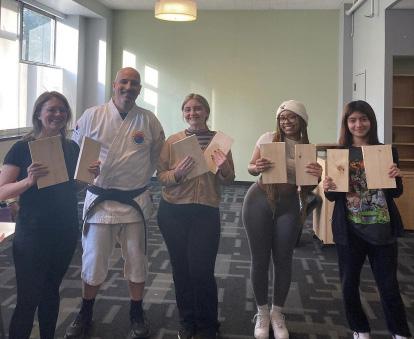
3 minute read
ManhattanCollege’sModel UNTeamMeetsWith UkranianStudents
Rebecca Kranich Social Media Editor
After a 23 hour bus ride to Brussels, Belgium and a seven hour flight to JFK airport, six Ukrainian students visited campus to meet with Manhattan College’s Model UN. The team of 16 will be representing Ukraine at the conference this week; however, this means much more than committees and awards.
Advertisement
While the Ukrainian students are not representing their own country at the conference, their presence and conversations held outside of committees are equally as important.
One of the students, Aleksandr Batkhin explains how they can use Model UN to spread information about their home country.
“The greatest thing we can do is to bring it outside the conference,” said Batkhin. “Like when you talk with your friends, your colleagues, your family and you tell them about how you represent Ukraine. You can tell them about Ukraine and you tell them what is going on,”
Ukrainian student Khrystyna Dmytryshyn explains how important Ukraine’s victory truly is.
“It’s not just about Ukrainians at all,” said Dmytryshyn. “It’s about a global victory, and a global peace, which is not possible without the victory of Ukraine.”
Furthermore, Batkhin explains the impact of Ukrainian victory in the scope of democracy.
“The victory of Ukraine is a victory of a civilized democratic world that wants better for their people against this vile opposition,” said Batkhin. “If we continue this fight we will make the day that the victory of democratic world will happen closer.”
All of the students expressed how important it is to share their stories. Specifically, Aleksandra Mudrak explained that as a young person growing up during a war, it is a natural instinct to defend yourself.
“[Your teenage years] are the best period of your life and sometimes it’s very hard to understand that you’re a citizen of a country which is currently at war since 2014,” said Mudrak. “And when you grow up, you understand the values of your life. We can provide a broader understanding on what’s going on not only from the news,”
Similarly, Alisa Lekenko added that growing up, people learn to represent themselves and that right now, the Ukrainian youth understand what they need to do.
“We can use this voice at the conference because thousands of students and hundreds of countries are involved and each student will bring home our stories to educate their neighbors about what is going on currently in Ukraine,” said Lekenko.
Fellow student Hanna Shypilova states that under their current conditions, sharing their experiences is the least they can do.
“I used to be a refugee in Germany in the beginning of the full scale invasion and it was really important to share my stories there,” says Shypilova.
“But here I feel that even more, I have this opportunity and I’m really grateful for it because we can speak and people can face Ukrainians in real life. We understand the world is pretty tired of the war. Of course, we also are tired of the war. We are really happy and proud that we can share.”
Anastasia Shablienko, another Ukrainian student who attended the event, gave insight into the war and what it means to Ukranians.
“We are finally able to spread this information all over the world and prove that the problem is not about Putin,” said Shablienko. “The problem is about the imperialistic state of mind and Russia’s desire to capture and to prove themselves.”
The two groups met virtually at the beginning of the semester, but this informal get-together was the first time the teams had met face-to-face.
Pamela Chasek, chair of the political science department and advisor for the Model UN team explains that creating bonds is the true function of the conference.
“I think it’s really cool because it shows the whole purpose of the conference, which is to bring people from different countries and different cultures together,” said Chasek. “To have contact and conversation with people from that country, makes it real. Our online meeting earlier this semester, when they talked about their own experiences, really hit everybody very hard, because now they know what they’re fighting for. It’s just not something theoretical, but it’s real people. So now, when they give their speeches and negotiate, they know who they’re fighting for.”
Manhattan College junior Synne Iversen Kverndal discussed the pressure of representing Ukraine at the upcoming conference.
“When knowing someone from Ukraine and hearing their stories, it becomes a responsibility to do their stories justice,”








